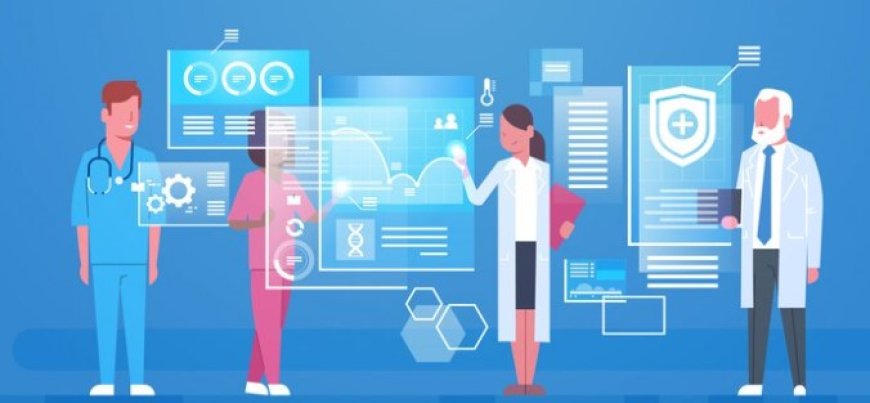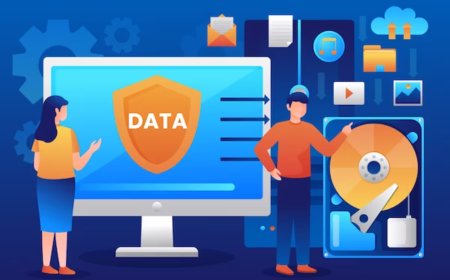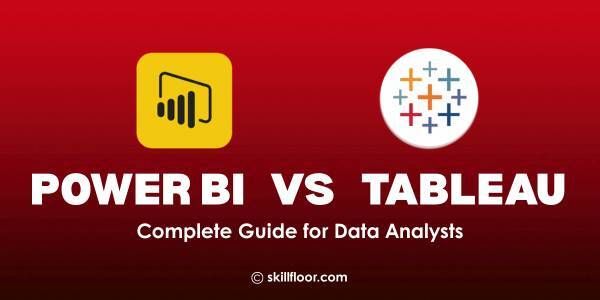Data Analytics in Healthcare: Improving Patient Outcomes and Operational Efficiency
Discover how data analytics in healthcare enhances patient outcomes and operational efficiency. Explore the impact of analytics on healthcare processes and decision-making.

In today's rapidly evolving healthcare landscape, the integration of data analytics has emerged as a transformative force. The introduction of "Data Analytics in Healthcare: Improving Patient Outcomes and Operational Efficiency" delves into the crucial role that data-driven insights play in revolutionizing healthcare delivery. By harnessing the power of data, healthcare providers can not only enhance patient care but also streamline operational processes. Join us on this informative journey as we uncover how data analytics is shaping the future of healthcare.
Data Analytics in Healthcare
Data Analytics in healthcare refers to the systematic use of advanced data processing techniques and statistical algorithms to analyze large volumes of healthcare-related information. It encompasses the extraction of valuable insights from diverse data sources such as electronic health records, medical imaging, and patient-generated data. This process enables healthcare professionals to make informed decisions, enhance patient care, and optimize operational workflows within the healthcare system. Through the application of Data Analytics, patterns, trends, and correlations can be identified, ultimately leading to improved patient outcomes and more efficient healthcare delivery.
The Role of Data Analytics in Healthcare
Data analytics in healthcare plays a multifaceted role, benefiting both patient care and operational efficiency.
Enhancing Patient Care
Data analytics empowers healthcare providers to offer more personalized and effective patient care. Through predictive analytics, healthcare professionals can anticipate health issues, enabling early interventions and preventive measures. This data-driven approach tailors treatment plans to individual patient needs, improving overall healthcare outcomes and patient satisfaction.
Improving Operational Efficiency
Data analytics is a catalyst for operational excellence within healthcare institutions. By analyzing administrative and clinical data, organizations can streamline internal processes, optimize resource allocation, and reduce operational costs. This efficiency not only benefits the healthcare facility but also ensures that patients receive timely and cost-effective care, ultimately enhancing the healthcare system as a whole.
Key Data Sources in Healthcare Analytics
Key data sources in healthcare analytics encompass a diverse range of information crucial for informed decision-making. Electronic Health Records (EHRs) serve as comprehensive repositories of patient medical history, diagnoses, treatments, and more. Medical imaging data, including X-rays, MRIs, and CT scans, provide crucial visual insights. Wearable devices and remote monitoring tools offer real-time patient-generated data, enabling continuous tracking of vital signs and health metrics. Additionally, administrative and billing data offers insights into operational aspects, including resource allocation and financial performance. These sources collectively form the foundation for robust healthcare analytics, driving improvements in patient outcomes and operational efficiency.
Real-World Applications
Data analytics in healthcare has demonstrated its transformative power through several compelling real-world applications. One notable example involves predictive analytics for chronic disease management. By analyzing patient data over time, healthcare providers can identify high-risk individuals, intervene proactively, and tailor treatment plans to each patient's unique needs. This approach not only improves patient outcomes but also reduces healthcare costs by minimizing hospitalizations.
Another impactful application is the use of data analytics to reduce hospital readmissions. Through the analysis of patient records and post-discharge data, hospitals can pinpoint factors contributing to readmissions and implement targeted interventions. This not only enhances the quality of care but also optimizes resource utilization.
Additionally, supply chain optimization in healthcare has benefited from data analytics. Hospitals and healthcare facilities can better manage their inventory, streamline procurement processes, and ensure the availability of essential medical supplies, ultimately contributing to improved operational efficiency and cost savings.
These real-world applications exemplify how data analytics is reshaping healthcare by enhancing patient outcomes and operational effectiveness.
Challenges and Considerations
Implementing data analytics in healthcare presents several challenges and considerations that organizations must address:
- Data Privacy and Security: Healthcare data is highly sensitive, and maintaining patient privacy is paramount. Ensuring robust data encryption, access controls, and compliance with regulations like HIPAA is essential to protect patient information.
- Integration of Disparate Data Sources: Healthcare organizations often have data spread across various systems and formats. Integrating and harmonizing this data to create a comprehensive view can be complex and resource-intensive.
- Staff Training and Adoption: Healthcare professionals may need training to effectively use data analytics tools and interpret the insights they provide. Ensuring staff are comfortable with these tools is crucial for successful implementation.
- Regulatory Compliance: The healthcare industry is heavily regulated, and data analytics initiatives must comply with various legal and ethical standards. Staying up-to-date with evolving regulations is a continuous challenge.
These challenges underline the need for careful planning and a commitment to ethical and secure data analytics practices in the healthcare sector.
Data Analytics Tools and Technologies
Healthcare-specific Analytics Platforms:
Healthcare organizations often rely on specialized analytics platforms designed to handle and analyze sensitive patient data efficiently. These platforms offer features tailored to the healthcare sector, such as secure data storage, interoperability with electronic health records (EHRs), and compliance with healthcare regulations like HIPAA. Examples include Epic Clarity, Tableau Healthcare, and IBM Watson Health Analytics.
Machine Learning and AI in Healthcare:
Machine learning and artificial intelligence (AI) are revolutionizing healthcare by analyzing large datasets to predict disease outcomes, identify treatment options, and streamline operations. These technologies can assist in diagnosing medical conditions, personalizing treatment plans, and automating administrative tasks, ultimately improving patient care and reducing costs.
Data Visualization Tools:
Data visualization tools are crucial for healthcare professionals to understand complex data and communicate insights effectively. These tools transform data into visually informative charts, graphs, and dashboards. Popular choices like Tableau, Power BI, and D3.js enable healthcare professionals to interpret patient data, track performance metrics, and make data-driven decisions for better patient outcomes and operational efficiency.
Future Trends in Healthcare Data Analytics
The landscape of healthcare data analytics is continually evolving, with several exciting trends on the horizon.
Firstly, AI-driven medical diagnosis is set to play a pivotal role. Machine learning algorithms will increasingly assist clinicians in diagnosing diseases, interpreting medical images, and predicting patient outcomes with high accuracy.
Secondly, telemedicine and remote patient monitoring will become more prevalent. These technologies will enable healthcare providers to remotely monitor patients, gather real-time data, and intervene promptly, reducing the need for in-person visits.
Thirdly, genomics data analysis will continue to advance personalized medicine. The integration of genomic information with patient records will lead to tailored treatment plans, enhancing therapeutic outcomes.
Lastly, blockchain technology will revolutionize healthcare data management by ensuring secure, immutable, and interoperable health records.
These trends collectively represent an exciting future for healthcare data analytics, promising improved patient care and operational efficiency.
Ethical and Legal Implications
In the realm of healthcare data analytics, ethical and legal considerations are of paramount importance.
Patient Consent and Data Ownership: As we harness patient data for analytics, ensuring informed consent and clarifying data ownership become critical. Patients should have a say in how their data is used and shared, and healthcare providers must establish transparent policies regarding data ownership and usage.
Bias and Fairness in Healthcare Algorithms: Bias in algorithms can lead to unfair treatment and decisions, which is particularly concerning in healthcare. Addressing bias and ensuring fairness in algorithms is crucial to maintain equity and prevent discrimination in patient care.
Compliance with Healthcare Regulations: The healthcare industry is heavily regulated, with laws like HIPAA (Health Insurance Portability and Accountability Act) governing patient data privacy and security. Compliance with such regulations is non-negotiable, and healthcare organizations must adapt their data analytics practices to align with legal requirements to protect patient information.
These ethical and legal considerations is fundamental to harnessing the full potential of data analytics in healthcare while upholding patient rights and well-being.
Healthcare data analytics stands as a transformative force with tangible benefits, including improved patient outcomes and streamlined operational efficiency. By harnessing the power of data, healthcare organizations can enhance patient care, optimize resource allocation, and reduce costs. The call to action for healthcare organizations is clear: embrace data analytics to unlock these advantages while navigating the ethical and legal considerations. The promising future of data-driven healthcare holds the potential to revolutionize the industry, ultimately leading to better health outcomes for all.






























































